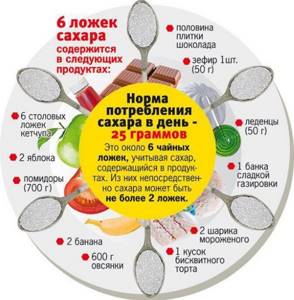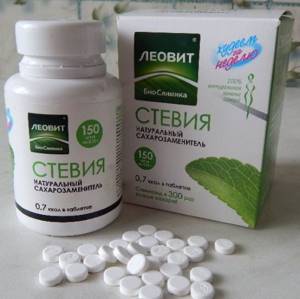Sugar: benefits and harm to the body - what kind of substance is it?
Sugar's molecular structure is a disaccharide - sucrose, consisting of two monosaccharides - glucose and fructose. Many sucrose molecules stuck together form a grain of sugar, which is what we see in the composition of the usual product.
Sucrose is a common reserve substance in plants, which is formed during photosynthesis and stored in stems, leaves, roots, flowers and fruits. The key stage of synthesis is the interaction of uridine phosphate glucose and 6-phosphate-D-fructose. Animals are not capable of biosynthesis of sucrose.
From what sources do we get sugar?
Research from the Swedish Food Administration shows that 40% of adults and 50% of children eat more than 10% artificially added sugar. But in general, we don't remember what we eat very well, so it's possible that these numbers are underestimated. This problem often arises in nutrition research.
It is sometimes said that one of the main sources of sugar for us is the unobvious sugar "hidden" in food, and this may indeed be true if you eat, for example, a lot of sweet fruit yogurt, cereals and the like. But for most, the main source of artificial sugar is still chocolate, baked goods and sweetened drinks.
It is also important how much you eat of a particular product. For example, ketchup contains a fair amount of sugar, but one tablespoon of ketchup—which is considered a standard serving—has only 3 to 5 grams of sugar, according to the State Food Administration. But in a can of sweet soda - 30-35 g.
How can you tell if a product contains sugar?
Sugar has many different names. For example, the ingredient label may list sucrose, dextrose, glucose, fructose, high fructose corn syrup, invert sugar, agave syrup, isoglucose, or honey. On the label, in the paragraph entitled “Carbohydrates, of which sugars...” it should be written how much natural and how much added sugar the product contains. Determining how much added sugar a product contains is more difficult. The State Food Administration has even compiled a special guide.
The whole truth about sugar: what are the benefits of the product

Glucose, which is formed in the body during the digestion of sucrose, is used for the synthesis of fats and glycogen. It is also an essential energy substrate for the brain, as it is able to penetrate the blood-brain barrier. The brain absorbs glucose from the blood most actively and in the largest quantities when compared with other tissues in these parameters. The functioning of the brain is closely related to the influx of glucose.
Important! When blood glucose levels drop, the kidneys, liver, muscles and heart can oxidize other substrates to maintain energy balance and maintain functionality. The brain continues to consume glucose under such conditions. When its concentration decreases below critical values, a person may lose consciousness or even develop a coma.
Glucose is also necessary for the production of serotonin, the hormone of joy. When its concentration in the blood increases, mood improves and emotional state normalizes. For the synthesis of serotonin, the body needs tryptophan and glucose.
Why is fructose in fruit still healthy?
Natural fruit sugar is found in fruits, vegetables and honey. Fruit-rich fructose is healthier than glucose. Insulin is not needed to break down in the human body. Therefore, blood sugar levels remain virtually unchanged after consuming fructose . In addition to fructose, fruits and vegetables also provide important fiber . They regulate digestion and thus can reverse or reduce the unwanted effects of fructose in the digestive tract. In addition, you can find many vitamins and minerals in fresh vegetables and fruits. They are important components of a balanced diet, and the amount of fructose in fruits is significantly lower than in soft drinks or confectionery. Therefore, a person would have to consume tons of fruit to get approximately the same amount of sugar . To save on fructose, you can use berries. They contain significantly less fructose than apples or pears.
Harm of sugar to the human body
According to modern scientific data, consuming fast carbohydrates in excess is the root cause of a large number of human diseases. In the course of evolution, it turned out that the human body is not adapted to consuming large amounts of simple carbohydrates. But “thanks to” the modern food industry, the availability of these nutrients has significantly increased. Due to their attractive organoleptic properties, many food products contain sugar and other fast carbohydrates that are easily digestible.
Important! Fast carbohydrates provoke the release of endorphins, which helps suppress stress reactions. Because of this, a psychological dependence on sweets can form.

The harm of sugar and other fast carbohydrates to health is due to the fact that these substances are characterized by a high rate of absorption from the gastrointestinal tract. They provoke a sharp increase in the concentration of glucose in the blood and an intense release of insulin. This hormone is necessary to reduce blood glucose levels because it helps transport it into the body's cells. In some situations, the rapid absorption and assimilation of glucose by cells leads to a drop in its level in the blood and the appearance of carbohydrate hunger. Because of this, a person craves sweets again. The result can be metabolic disturbances up to obesity, since glucose is used by the body to synthesize fats. In the future, this can lead to insulin resistance, diabetes, atherosclerosis, strokes, and heart attacks.
Fast carbohydrates are not recommended for consumption both when losing weight and when gaining muscle mass. Because in both cases they can have their negative effect. Their consumption in small quantities can be justified only when gaining weight before or immediately after a workout, during the so-called protein-carbohydrate window, as well as in the morning.
Note! The greatest danger to your figure comes from eating fast carbohydrates in the afternoon. At this time, the human body has a greater predisposition to convert them into fat reserves.
The sad truth about sugar is that it has an extremely negative impact on your oral health. Regardless of age and intensity of physical activity, eating sweets creates the prerequisites for the nutrition and reproduction of various types of bacteria in the oral cavity. And during their life cycle, they release substances that damage even healthy teeth. That's why dentists recommend rinsing your mouth thoroughly after eating sweet foods.
Sugar is especially dangerous for people with slow metabolism. And also for those who lead a sedentary lifestyle and do not properly utilize the resources they consume. Therefore, when eating sweets in these cases, the following consequences are possible:
- excess fat deposition, weight gain;
- violations of the functional state of the pancreas;
- increased risk of food allergies as a result of impaired metabolic reactions.
If a person cannot give up sweet foods, then his norm should be a fairly active lifestyle.
Long-term effects of sugar consumption?
Increased sugar consumption makes the body weak and tired . This is due to constantly falling sugar levels . In addition, stomach and intestinal problems such as diarrhea, constipation or flatulence may occur. The skin can also react negatively to excessive consumption of sweets. Typical symptoms include a fungal infection or hair loss. Nervousness, sleep disturbances and poor concentration are also associated with sugar consumption. The immune system is also weakened. Infectious diseases develop much faster. A common complication of excessive sugar consumption is what is called diabetes. Do not forget that too much white sweetness is one of the most important causes of excess weight. If the body does not consume sugar, it is stored as fat. Add to this dangerous fatty liver and kidney problems. Finally, the teeth are attacked by sweetness, which promotes tooth decay.
Why do food manufacturers use different types of sugar?
In food production - both in trade and industry - not only household sugar is used, but also other types of sugar . an important reason for this : types of sugar differ in their structure and properties. They differ in their taste, as well as in their culinary and baking properties. Additionally, sweetness, flavor, solubility, viscosity, browning, and water . Each type of sugar can have a different effect on the consistency of the product. Technical differences between types of sugar play a role in the production of yogurt, for example, because lactic acid bacteria cannot use all types of sugar equally well in fermentation processes.
- Fructose: The monosaccharide fructose has the highest solubility and sweetness of all sugars and can also absorb more (air) moisture. Better than all other types of sugar, fructose ensures that baked goods brown well and develop a pleasant flavor. For example, if you sweeten ice cream with fructose, it becomes extra creamy and freezes beautifully.
- Dextrose: Dextrose or glucose is a monosaccharide similar to, but significantly different from, fructose. It is less soluble and has less sweetness. Dextrose is used in baking to optimize yeast fermentation, and in sports and energy products it is used as a quickly available and less sweet carbohydrate.
- Lactose: Lactose comes from milk and is the type of sugar with the lowest solubility and significantly reduced sweetness. In browning reactions, lactose is more reactive than sucrose and produces specific aromas, which in turn creates a distinctive taste. Therefore, it is often used in chocolate and baked goods to support flavor development and browning.
- Glucose syrups. Glucose syrups are made, for example, from starch and consist of glucose, maltose and longer chain carbohydrates (oligosaccharides). Depending on their composition, glucose syrups vary in viscosity and sweetness. Glucose syrups affect how hard or soft hard candies become and prevent unwanted crystals from forming in soft candies. The same applies to the production of jelly and rubber products: the selection of a suitable glucose syrup has a significant impact on chewing properties and shelf stability.
Sugar: myths and truth - can you eat it without harm to your health?

Everything is good in moderation. It is important to understand the importance of sugar and its breakdown products for the human body and under no circumstances abuse it in food. It is necessary to remember that:
- Sugar is not just the granulated sugar or refined sugar we are used to. Sucrose is found in honey and sweet fruits. And their consumption in moderate quantities will bring significant benefits to the body, since these products contain many useful substances;
- You should rinse your mouth after every meal - this way you can wash away food residues from your teeth and keep them healthy;
- To expend accumulated energy, you should move more often. This way, all the sweets that you consumed will be used to work the muscles and activate various processes in the body, and will not be stored;
- The recommended amount of added sugars in the diet should not exceed 10% of daily calories (which does not include naturally occurring sugars from whole vegetables, fruits and milk).
When choosing sugar, you should give preference to natural sugars: honey, barley malt, natural plant and fruit sugars - brown, coconut, cane, birch, brown rice. It is also recommended to avoid toxic synthetic sugars, which include corn syrup, sucrose, Splenda, dextrin, white sugar, hydrogenated starch, maltodextrin, xylose. They provoke disturbances in metabolic processes, the functioning of the brain and the endocrine system.
You can turn your attention to stevia - it is a plant-based sugar substitute with no identified adverse reactions. When cooking, it is recommended to use spices - carob, cinnamon. They are characterized by a sweetish taste, these spices are beneficial for the body.
Types by degree of refining
According to the degree of purification (refining), sugar is divided into:
- brown sugar (raw materials of varying degrees of purification);
- white (completely peeled).
Different degrees of refining determine the composition of the product. A comparison of the composition of the products is shown in the table. Having almost the same calorie content, they differ in the content of microelements.
| Characteristics | Refined white sugar from any raw material | Unrefined brown sugar from cane (India) |
| Calorie content (kcal) | 399 | 397 |
| Carbohydrates (gr.) | 99,8 | 98 |
| Proteins (gr.) | 0 | 0,68 |
| Fats (gr.) | 0 | 1,03 |
| Calcium (mg) | 3 | 62,5 |
| Magnesium (mg) | – | 117 |
| Phosphorus (mg) | – | 22 |
| Sodium (mg) | 1 | – |
| Zinc (mg.) | – | 0,56 |
| Iron (mg) | – | 2 |
| Potassium (mg) | – | 2 |
The table shows that the vitamin and mineral content in brown sugar is higher than in refined white sugar. That is, brown sugar is generally healthier than white sugar.
Download the table comparing different types of sugar right here so that you always have it at hand.
What else is important to know about sugar?

Important:
- consume sugar rarely and as a treat, even the best types;
- avoid hidden sugars - for this you need to carefully study the composition of the purchased products (especially bread, sauces, yoghurts, baby food);
- added sugars provide extra calories and minimal benefit;
- natural sweeteners - fruits, dried fruits, juices;
- When eating natural foods, the craving for sugar decreases, the addiction to sweets disappears, but the pleasure of eating natural sweets appears.
If you feel a strong sugar addiction that you cannot cope with, you should immediately consult a doctor. The results of biochemical and hormonal studies will help the specialist determine the severity of the problem and prescribe adequate measures to correct the condition.
This may not be the whole truth about sugar. But exactly what is described above will help to correctly assess the importance of this product for the body and form the right attitude towards its use.
Thanks for sharing with your friends!
- 1
Sugar can cause diabetes
One of the most important hormones in the body is insulin.
It is he who is responsible for transporting glucose to cells, giving them a signal to destroy it without touching fat.
- Excess glucose is very toxic, causing diabetes and even blindness.
Metabolic dysfunction brings with it many health problems, but the main one is the “breakdown” of insulin, when cells begin to resist this hormone, which leads to metabolic syndrome, obesity, heart and vascular diseases and, of course, type 2 diabetes.
conclusions
This article is in no way encouraging you to eat more sugar. If you want, reduce your consumption as soon as you think you need it. It is very easy to exceed the norm for sugar consumption, because there is a lot of it in sweets, buns and chocolate. And because of this, you are more likely to gain excess weight, which causes many diseases. But don't focus only on sugar. Most studies indicate that health is influenced more by the diet as a whole, rather than by any individual food.
Even if you eat the healthiest, varied diet, consisting mostly of fruits, vegetables, legumes, whole grains, olive oil, fish, seeds and nuts, you can sometimes indulge in a piece of chocolate or a muffin.
Is there a replacement?
The only people who cannot do without sweeteners are people with diabetes. But nutritionists still doubt whether everyone else needs sweeteners.
Sweeteners are food additives. Many of them are many times sweeter than sugar, but have fewer calories. However, it turned out that this does not mean that those who use them will immediately become slim. Scientists conducted an interesting experiment on rats. They fed some rats yogurt containing natural sugar, and others yogurt with artificial substitutes. As a result of the experiment, the appetite of rodents whose diet included a sugar substitute increased significantly and they began to gain weight. However, it has not yet been proven that sweeteners cause a similar effect in people.
Not only nutritionists, but also doctors have concerns about sweeteners. Some doctors believe that some sweeteners can cause kidney failure and are carcinogenic. However, all these statements remain speculation.
Recommendations
The effect of sugar on the human body can be reduced if you adhere to certain rules for consuming the white product. In order to benefit from the use of a sweet substance, you need to know the consumption rates. We should not forget that sucrose is present not only in refined form, which is added to hot drinks and dishes, but also in finished products.
Science has calculated the necessary and acceptable amounts of simple carbohydrates per day. According to the World Health Organization, the dose of sugar should not exceed 0.025 mg per day or 10% of the number of calories consumed per day.

Sugar consumption standards:
- healthy, active men 19-30 years old can consume up to 12 tsp. white sweet substance per day;
- from 30 to 50 years old, the stronger half should eat no more than 55 g of sucrose in 24 hours;
- more mature men are limited to 10 liters. sugar per day;
- women without hormonal pathologies or aged from 18 to 30 years – 0.050 kg of sweet substance per day;
- the fair half under 50 years of age should not consume more than 45 g of sucrose per day;
- women of retirement age or with metabolic disorders - dose of sucrose 6 tsp;
- people with excess body weight and improper production of the hormone insulin should reduce the amount of sugar to a minimum, but you can eat a small amount of fruit;
- children under 2 years old do not need refined sweet substances;
- Children 3-9 years old can eat 6 tsp. sucrose;
- from 9 to 14 years – 0.045 kg of sugar per day;
- youth up to 18 years of age - consumption rate is no more than 50 g per 24 hours
Today there are a lot of sugar substitutes, both natural and artificial. For healthy people leading an active lifestyle, foods that can benefit the body in the right quantities can be a good alternative to refined carbohydrates.

For example:
- a sweet, thick substance produced by bees from the juice of flowers : contains a large amount of minerals; is a primary substitute;
- fruit monosaccharide fructose : does not increase blood dextrose levels.
In case of pathologies associated with the production of the hormone insulin, endocrinologists recommend replacing sucrose with artificial sweeteners, adding the substances to ready-made dishes.
They are as follows:
- pentanpentaol;
- hexahydric alcohol glucite, which has a sweet taste;
- aspartyl - phenylalanyl.
The above sweeteners do not differ significantly in taste from sucrose, but, like refined sugar, their quantity should be limited to 0.040 kg per day. It should be noted that artificial substitutes have a number of negative manifestations. Over time, they can provoke the development of cancer.
A plant-based alternative to traditional refined sugar includes stevia, an herb from the Asteraceae family. Endocrinologists and nutritionists recommend this type of substitute as a priority in the fight against excess weight.

Plant:
- has a very rich sweet taste;
- does not affect the level of dextrose in liquid connective tissue;
- can be used for children;
- does not provoke side effects.
For confectionery lovers, dietary dishes with pleasant taste sensations that will benefit the body can be an excellent replacement.
They are as follows:
- oven-baked apples;

- marshmallows made from natural juice;
- cookies made from grain flour with the addition of a small amount of finely chopped dry homemade fruit;
- bitter product containing at least 60% cocoa butter.
The effect of sugar on humans is very great. In order not to harm the body, you should always remember the balance of carbohydrates in the diet and the rate of sucrose consumption.
Article design: Oleg Lozinsky










